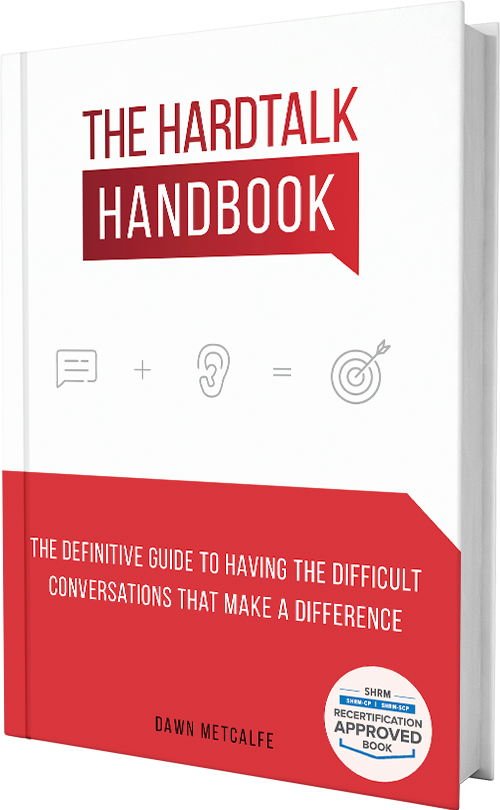
Talk it out.
Are you sometimes frustrated by how things are going at the office? And what about at home? Is there an occasional haze of silence that nobody wants to acknowledge? Do some subjects seem to be off-limits for candid conversation?
The proverbial elephant in the room can sabotage the best of relationships. And regardless of what’s in your bag of technical skills, if you don’t have—and use—good conversation skills, ignored problems simply get bigger.
Dawn Metcalfe can help. A seasoned executive coach and leadership advisor, she’s founder of a Dubai-based training company and author of The HardTalk Handbook.
I’ve read literally dozens of books about conversation skills, and this one ranks as one of the very best. So I reached out to Dawn to explore her views on how to handle challenging conversations.
Rodger Dean Duncan: What are the ingredients of what you refer to as HardTalk?
Dawn Metcalfe: There are three things that make up a “HardTalk,” or difficult conversation. These are difference, topic, and purpose.
Difference, or diversity, is a good thing. We know that organizations with a diverse workforce and leadership do better. But diversity can also be a cause of difficulty. I live in Dubai, one of the most diverse places in the world, a real chopped salad (not melting pot) and see it all the time. The more differences there are between us, the more likely it is that, unless we work hard, there will be misunderstandings. And very often conversations are avoided all together because we’re afraid of causing offence and don’t want to be rude. So the whole point of diversity—hearing different points of view—is lost.
Topic is the second element, because some topics are inherently more difficult to talk about than others. For example, money, performance, personal hygiene.
The final element is purpose—what it is that you want from having the HardTalk? And what do others perceive you to want? Most of us have healthy, long-term purposes when we talk to others about something difficult. But our neurobiology works against us and so, just when we should be behaving at our best, we show our worst!
Duncan: Give us an example.
Metcalfe: Very few leaders want to allow poor performance to go unchecked, or play favorites, or give the impression they don’t care about the people with whom they work. Yet many employees feel that that’s exactly what they do.
In the moment, the executive part of our brain stops functioning effectively and the monkey or lizard brain takes over. I like to describe it as Mr. Spock taking a break and Homer Simpson performing a coup.
And what does Homer Simpson want? An easy life and to do what feels good right now. Generally speaking, most of HardTalk is keeping Homer under control and managing your behavior so that the people around you can see that your purpose is a good one. It’s all about intent rather than content. You can talk about pretty much everything, with pretty much anyone, if they believe your purpose is a good one.
Duncan: To help facilitate difficult conversations, you advocate operating by what you call “the rules of adulting.” What are those rules, and what role do they play in effective relationship building?
Metcalfe: We talk about the two rules of adulting.

The first rule is that you can make any decision you like, but you have to live with the consequences. This is fairly self-explanatory.
The second is a bit more layered: Everything is a decision. Even non-action (i.e., doing nothing) is the same as an action. Both come with consequences. We are constantly judging, and being judged, based on this.
Duncan: Many people think they’re pretty good at listening, but they’re not nearly as good as they believe. How can mindful curiosity help?
Metcalfe: Mindful curiosity is really the only thing that can help. Everything else is techniques. You can be taught the techniques very easily because, on paper, they’re not that difficult. But learning them is hard, because what you’re really learning is that most of us are way more interested in ourselves than in others. You need to be mindful of that and of how far your behavior in the moment reflects that usual lack of curiosity.
Duncan: Some difficult conversations are especially important to have. Others are not. How can you tell the difference?
Metcalfe: We ask people to go through a number of steps to decide on what they want to talk about. We even created a “DecisionTree” to help walk them through each step. It’s a complex question in many cases, and you need to conduct a risk/cost benefit analysis. Ultimately it comes down to my favorite motto—“If it’s important, you’ll find a way. If it’s not, you’ll find an excuse.”
The first step is to work out what you want to talk about. More often than not, there are a number of potential topics and it’s important to separate them out and examine them separately.
One of the ways we do that is to ask people to write out the situation they’re facing as though from a third point of view, and then separate it into aches, pains, and emergencies.
Aches are something that has happened once. For example, somebody is late to a meeting. It’s usually relatively straightforward to address, at least compared to pains, which are patterns of behavior (somebody is late repeatedly). And finally there are the emergencies. This is when either an ache or a pain is so serious it’s having an impact on your ability to get things done, or be happy, or on the relationship with the other person. It’s coming up to crisis time.
Duncan: If you decide to skip a hard conversation, how can you be sure you’re not simply rationalizing because you want to avoid the hassle?
Metcalfe: This is something we address in a number of different ways and summarize in the DecisionTree. It’s all about asking yourself difficult questions and forcing your brain to avoid falling into the traps our neurobiology sets for us.
Duncan: What kind of internal filters affect our conversations, and how can we become more aware of—and take into account—their effect?
Metcalfe: When we talk about filters, we talk about all the things that have gone into making you who you are. So it’s generation, education, religion, national culture, the countries you’ve visited, the stories you’ve read. Separating the truths (what we see and hear) from the potentials (what we think and feel about what we see and hear) is very important. To do this, we need to be aware of adjectives.

Adjectives are pretty much always an indication of judgment, so when I hear one I like to ask the question “What filters are in place that got me there and what truths are at the bottom of it?” That helps me challenge my own views in the moment. For example, if I find myself thinking, “She’s bossy!” I consider all the truths I’m basing that on, which could be asking me without saying “please”, interrupting in a meeting, or holding me to account for a task I had agreed to complete.
Then I wonder how I made the jump from these truths to come up with the potential that “she’s bossy.” I might decide I’m okay with the reasons and mine is the only explanation. Or I might consider that other people, with equally good purposes, could come up with a different interpretation.
This allows me to be curious and open to learning if I decide to speak up. And so it makes it more likely that others will speak up too. If we can do this successfully we have the conditions for high performing individuals, teams, and organizations.
Duncan: What are some good ways to bridge the divide between ourselves and people who have different backgrounds and perspectives?
Metcalfe: My first experience of living in a genuinely foreign place was Japan. I’d lived and worked in European countries, but we shared many of the same cultural norms. In Japan, nothing made sense to me—mustard was in red bottles, ketchup in brown, and people bowed on the phone. But if you looked more closely, people were really the same. They all want the same thing—to love and be loved, to contribute, to feel safe, etc.
This may sometimes express itself differently because of the filters, but purposes are universally shared.
If you assume humanity and ask questions with real curiosity, there is usually a connection to be made. Techniques like paraphrasing and using open-ended questions are easy to teach, but this attitude is something that has to be learned over time.
We talk about being a HardTalk practitioner because, to my ears, that implies a responsibility to recognize that you could always be better.
Duncan: In a difficult conversation situation, how can we ensure that what we say is a response rather than a reaction?
Metcalfe: This is the hardest thing for most people, including me, and I’ve written a book and training program about it! Which just goes to show that we need to continually practice what we learn.
You need to think about what you really want and not what feels good in the moment (such as losing your temper with someone) in order to manage your emotions. I find that if I plan the conversation in advance (not every word, of course), work through my own purpose, truths and potentials in a structured way, then it tends to go better. The problem is, sometimes we don’t have time to plan. But it’s precisely in these situations that the planning we have done before helps us. In these situations, I like to buy time where possible. But when it’s not, it’s back to self-awareness—knowing what you’re doing and the impact it’s having on your purpose and the people around you.
Duncan: In a difficult conversation situation, what are the consequences of being silent?
Metcalfe: It depends, of course, but the worst case is that you go speechless and nothing changes. So you get progressively more frustrated until you explode, or speak up in a way that is unhelpful or does more harm. This practically guarantees a negative reaction from the person you’re speaking with, so now you have “proof” that speaking up is dangerous. Armed with this, you go speechless again, and you’re caught in the spiral of doom.
Duncan: How can “naming and claiming” one’s emotions be helpful in a difficult conversation?
Metcalfe: This is a very important part of HardTalk. In essence you’re stopping the Homer part of your brain for a second, by summonsing Mr. Spock to get involved and identify the emotion you feel. The more specific you can be, the better. Some people struggle with naming emotions beyond happy, or sad, or angry—so we provide a free emotion wheel on the website which they can download.
Duncan: You describe bias (conscious or not) as a “brain drain.” How does that work, and what are some common biases that might be hard to notice?
Metcalfe: I don’t like to talk about bias because I’ve noticed that all of us react badly to the concept of being biased, even if unconscious. Instead I like to talk about the fact that our brains like patterns.
This makes sense because our brains want to do things the easy way! So they make it easy for us by saying “We’ve made up our mind and here’s proof that we’re right” (confirmation bias) or “I know what leaders sound like and you don’t sound like one” (gender bias). Any time we (Mr. Spock) are not in control, we’re more likely to fail at HardTalk.
Duncan: What are the best ways for people to become aware of their blind spots?
Metcalfe: Build self-awareness. Look at your behavior and its impact and the adjectives and language you’re using. Deliberately expose yourself to other points of view. I follow people on Twitter whose lives and viewpoints differ from mine. Some are joyful and I learn a lot. Some are awful and I still learn a lot.
Duncan: How can contrasting be useful in a difficult conversation, and how does it work?
Metcalfe: Contrasting is about being crystal clear on what your purpose is—with yourself and with the person you’re speaking with. But, as the word implies, acknowledging that they may have a different point of view. The key to contrasting is that it forces you to see that it’s possible you could be misunderstood and to acknowledge it out loud while clarifying your actual purpose. You must do both. For example, you might say, before you tell somebody they smell bad “I don’t want to embarrass you in way. I do want to tell you something I think will be news to you.”
Duncan: What is the Fundamental Attribution Bias, and how can we avoid it?
Metcalfe: The Fundamental Attribution Bias refers to the human tendency to be great lawyers for ourselves and great judges of others, as we explain our (bad) behavior in terms of external forces … “I was late because it was raining!” and the (bad) behavior of others as a function of their personality … “He was late because he’s disorganized!”
Entering a HardTalk with a preconceived notion of the intent of others is the norm, but it doesn’t help because humans are doom-mongers and almost always assume it’s something negative. So if you’re not talking in good faith, if your purpose is wrong, and if you’re going in looking for something to “help your case” or prove you right, it’s not a great start!
Duncan: What behaviors or mindsets are most helpful to people who sincerely want to improve their skills with difficult conversations?
Metcalfe: Effective HardTalk behaviors are easy—or at least learnable for most people—but only if your mindset or attitude allows for them.
If you really believe the person you’re talking to is a psychopath whose micromanaging ways are a deliberate attempt to get you, then don’t bother talking and, if you’ll take my advice, get out! If you don’t believe that, and you’re curious about why, in your view, they’re behaving like they are, then you’ve got some hope. More practically? Set reminders to practice regularly. Never think you know it all. It’s a skill that develops over time.

